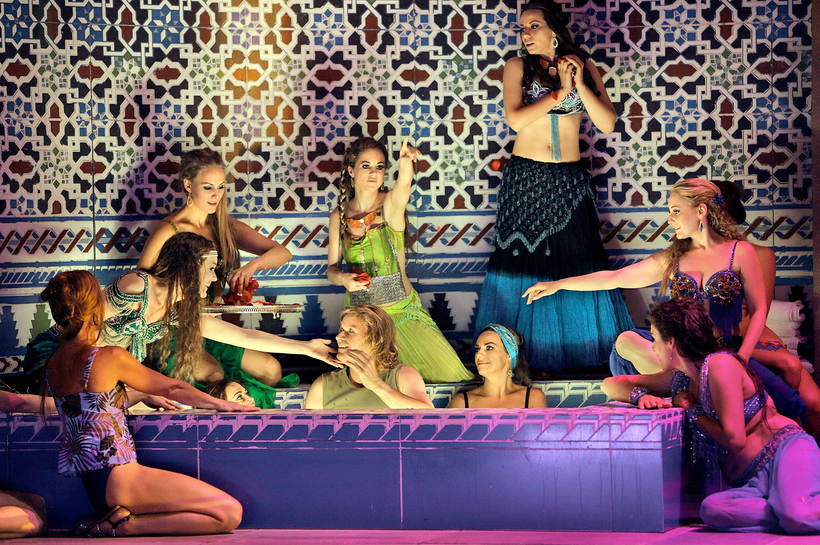For the opening of the 2016 season, the Bayreuth Festival, exclusively dedicated to the works of its founder Richard Wagner, kept the red carpet rolled up tight. Word had leaked that Uwe Eric Laufenberg’s new production of Parsifal (video now available online) cast shade on Islam—this, as lone-wolf young Muslims were terrorizing Germany with popup acts of horrific violence.
A religiose allegory of obscure intent, drenched in Oedipal eroticism, Parsifal is Wagner’s testament. He unveiled it in Bayreuth in 1882, stipulating that it be played nowhere else—mainly for spiritual reasons but also because of acoustics. Custom-built for the premiere of the “Ring” cycle in 1876, Wagner’s “Festspielhaus” features a revolutionary orchestra pit, recessed below the stage and shielded from public view by a canvas hood. By the time Wagner wrote Parsifal, he wasn’t just imagining the sound picture that would result—he knew from live experience. After his death, the genie escaped the magic lamp. But to true believers, only a Bayreuth Parsifal is the real thing.
Derived from Arthurian legend, Parsifal finds the knights who guard the Holy Grail in disarray. Amfortas, their king, has lost their equally prized sacred spear to a renegade wizard. Parsifal is the clueless innocent who defeats the wizard and brings the spear home. Needless to say, the mashup of symbols is catnip to ambitious directors of every stripe.
Laufenberg’s modern-dress production relocates the action to some remote Middle Eastern shrine haunted by monastic Christians, Muslim soldiers, and Jewish civilians, all thirsting for redemption in a fallen world. A buzzword on German critics’ lips was “Stadttheater” (read: low-rent), but that seems harsh. If video sequences that sweep viewers from earth to beyond the stars strike some as corny, others will find them inspirational. And the set, doubling as the derelict sanctuary of the Grail and the tacky citadel of the wizard, is right in sync with Wagnerian paradox. Disrespect to Islam, if any, would be in the eye of the beholder.
The appealing American baritone Ryan McKinny appears as the self-lacerating Amfortas, bleeding buckets—this is hard to take—and crowned with thorns. In the pivotal role of Gurnemanz, a knight who bears witness, the German bass and Alec Guinness–look-alike Georg Zeppenfeld delivers non-rhetorical yet heartbreaking eloquence. As Parsifal, the tenor Klaus Florian Vogt, also German, marries unsettlingly boyish timbre to big-time firepower.
As always, the most perplexing figure in the carpet is Kundry, a projection of the Eternal Feminine who is part street person, part glamour queen. In face, build, and sometimes dress, the Russian soprano Elena Pankratova resembles the embattled wives and mothers we’re seeing on nightly news reports from war-scarred Ukraine. That’s a jolt. But Pankratova’s personal authenticity and fearless, richly colored vocalism mark her as one of Kundry’s foremost avatars of the past half century. Another big plus: Harmut Haenchen’s conducting. Where many play up the mystique of the score by stretching tempi to the breaking point and beyond, Haenchen keeps it moving forward.
Parsifal is available for streaming on Stage+
Matthew Gurewitsch writes about opera and classical music for AIR MAIL.He lives in Hawaii

